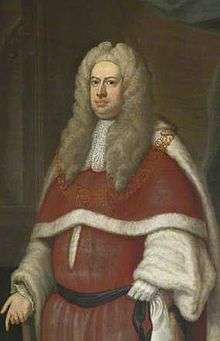Robert Raymond, 1st Baron Raymond

Robert Raymond, 1st Baron Raymond PC (20 December 1673 – 18 March 1733) was a British judge.
Life
Raymond was the son of the judge Thomas Raymond. He was educated at Eton and Christ's College, Cambridge. Said to have been admitted to Gray's Inn aged nine, he became a barrister in 1697 and was admitted at Lincoln's Inn in 1710.[1] In 1725 he was invested as Privy Counsellor.[2]
Raymond, a Tory, was appointed as Lord Chief Justice of the King's Bench on 2 March 1725, a post he held until his death. In the trial of Deist Thomas Woolston in 1729 Raymond said:
Christianity in general is Parcel of the Common Law of England, and therefore to be protected by it; now whatever strikes at the Root of Christianity, tends manifestly to a Dissolution of the Civil Government...so that to say, an Attempt to subvert the establish'd Religion is not punishable by those Laws upon which it is establish'd, is an Absurdity.[3]
In 1731 he was raised to the peerage as Lord Raymond, Baron of Abbots Langley in the County of Hertford.[4] In the House of Lords he tried to stop the House of Commons abandoning Law French and replacing it with English. To Raymond, ending the traditional language might lead to other 'modernisations' such as Welsh for courts in Wales. However his opposition failed and in 1733 the courts were anglicised.[5]
In 1720 he built for himself a country house and estate at Langleybury 2 miles (3.2 km) north of Watford in Hertfordshire. His monogram and his cipher, a griffin in a crown, can still be seen on the exterior of the building.
References
- ↑ "Raymond, Robert (RMNT689R)". A Cambridge Alumni Database. University of Cambridge.
- ↑ Leigh Rayment's Peerage Pages
- ↑ John Fitz-Gibbons, The Reports of Several Cases Argued and Adjudged in the Court of King's Bench (London, 1732), pp. 65-66.
- ↑ The London Gazette: no. 6951. p. 1. 9 January 1730.
- ↑ R. C. Caenegem, An Historical Introduction to Private Law (Cambridge University Press, 1992), pp. 174-5.